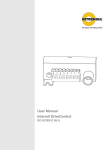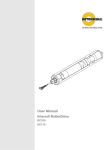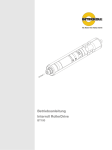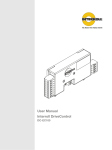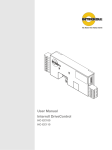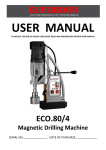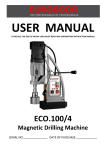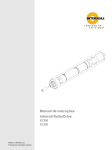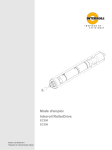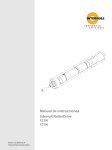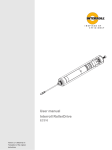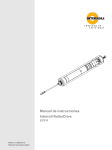Download User Manual Interroll RollerDrive
Transcript
User Manual Interroll RollerDrive EC300 Manufacturer Interroll Corporation 3000 Corporate Drive USA-Wilmington, NC 28405 Tel. +1 910 799 11 00 Fax. +1 910 392 38 22 www.interroll.com Copyright The copyright of this manual remains with Interroll Corporation. This manual includes regulations and technical drawings which may not be copied or duplicated either whole or in part. Unauthorized use, publication or application of this document is prohibited. Version 1.0 (11/2007) en Original language RollerDrive EC300 Table of contents Introduction Table of contents Handling of the user manual . . . . . . . . . . . . . . . . . . . . . . . . . . . . . . . . . . . . 2 Warning notices in this manual . . . . . . . . . . . . . . . . . . . . . . . . . . . . . . . . . . 2 Further symbols . . . . . . . . . . . . . . . . . . . . . . . . . . . . . . . . . . . . . . . . . . . . . 3 Safety General safety instructions Intended use . . . . . . . . . . . Unintended use. . . . . . . . . Qualified persons . . . . . . . Risks . . . . . . . . . . . . . . . . . Interfaces . . . . . . . . . . . . . . . . . . . . . . . . . . . . . . . . . . . . . . . . . . . . . . . . . . . . . . . . . . . . . . . . . . . . . . . . . . . . . . . . . . . . . . . . . . . . . . . . . . . . . . . . . . . . . . . . . . . . . . . . . . . . . . . . . . . . . . . . . . . . . . . . . . . . . . . . . . . . . . . . . . . . . . . . . . . . . . . . . . . . . . . . . . . . . . . . . . . . . . . . . . . . . . . . . . . . . . . . . . . . . . . . . . . . . . . . . . . 4 4 4 4 5 5 Product information Components . . . . . . . . . . . . . . . . . . . . . . Product description . . . . . . . . . . . . . . . . RollerDrive label . . . . . . . . . . . . . . . . . . . Product identification . . . . . . . . . . . . . . . Technical data . . . . . . . . . . . . . . . . . . . . Performance data . . . . . . . . . . . . . . . . . . Performance charts. . . . . . . . . . . . . . . . . DriveControls for the RollerDrive EC300 . Motor plug . . . . . . . . . . . . . . . . . . . . . . . Speed settings . . . . . . . . . . . . . . . . . . . . RL definition . . . . . . . . . . . . . . . . . . . . . . Dimensions of the motor shaft . . . . . . . . Dimensions of idler cartridges. . . . . . . . . Groove locations . . . . . . . . . . . . . . . . . . . Conical RollerDrives . . . . . . . . . . . . . . . . .... .... .... .... .... .... .... .... .... .... .... .... .... .... .... ... ... ... ... ... ... ... ... ... ... ... ... ... ... ... ................... 6 ................... 7 ................... 8 ................... 8 ................... 9 ................... 9 . . . . . . . . . . . . . . . . . . 10 . . . . . . . . . . . . . . . . . . 10 . . . . . . . . . . . . . . . . . . 11 . . . . . . . . . . . . . . . . . . 12 . . . . . . . . . . . . . . . . . . 13 . . . . . . . . . . . . . . . . . . 13 . . . . . . . . . . . . . . . . . . 14 . . . . . . . . . . . . . . . . . . 15 . . . . . . . . . . . . . . . . . . 15 Transport and storage Transport . . . . . . . . . . . . . . . . . . . . . . . . . . . . . . . . . . . . . . . . . . . . . . . . . 16 Storage . . . . . . . . . . . . . . . . . . . . . . . . . . . . . . . . . . . . . . . . . . . . . . . . . . . . . . 16 Assembly Warning notices concerning assembly . . . . . . . . . . . . Warning notices concerning the electrical installation . Setting up a roller conveyor . . . . . . . . . . . . . . . . . . . . Inserting the RollerDrive EC300 in the conveyor frame Mounting tool . . . . . . . . . . . . . . . . . . . . . . . . . . . . . . . Electrical installation . . . . . . . . . . . . . . . . . . . . . . . . . . . . . . . . . . . . . . . . . . . . . . . . . . . . . . . . . . . . . . . . . . . . . . . . . . ... ... ... ... ... ... .... .... .... .... .... .... 17 18 18 19 21 22 Initial startup and operation Initial startup . . . . . . . . . . . . . . . . . . . . . . . . . . . . . . . . . . . . . . . . . . . . . . . 23 Operation . . . . . . . . . . . . . . . . . . . . . . . . . . . . . . . . . . . . . . . . . . . . . . . . . 23 Procedure in case of accident or malfunction . . . . . . . . . . . . . . . . . . . . . . 23 Maintenance and cleaning Warning notices concerning maintenance and cleaning . . . . . . . . . . . . . . 24 Maintenance . . . . . . . . . . . . . . . . . . . . . . . . . . . . . . . . . . . . . . . . . . . . . . . 24 Cleaning . . . . . . . . . . . . . . . . . . . . . . . . . . . . . . . . . . . . . . . . . . . . . . . . . . 24 Troubleshooting Error search . . . . . . . . . . . . . . . . . . . . . . . . . . . . . . . . . . . . . . . . . . . . . . . 25 Abandonment and disposal Abandonment . . . . . . . . . . . . . . . . . . . . . . . . . . . . . . . . . . . . . . . . . . . . . . 26 Disposal . . . . . . . . . . . . . . . . . . . . . . . . . . . . . . . . . . . . . . . . . . . . . . . . . . 26 Appendix Accessories . . . . . . . . . . . . . . . . . . . . . . . . . . . . . . . . . . . . . . . . . . . . . . . 27 Manufacturer's declaration . . . . . . . . . . . . . . . . . . . . . . . . . . . . . . . . . . . . . . . 28 Version 1.0 (11/2007) en Original language 1 RollerDrive EC300 Introduction Handling of the user manual Introduction Content of the manual Validity of the manual This manual contains important advice, notes and information about the RollerDrive EC300 in all phases of its lifecycle: • Transport, assembly and commissioning • Safe operation, maintenance and troubleshooting, disposal • Accessories The manual describes the RollerDrive EC300 as it is delivered by Interroll. Special application designs require validation from Interroll and additional technical instructions. The manual is part of the product ¾ For trouble-free, safe operation and warranty claims, read the manual and follow the instructions before handling the RollerDrive EC300. ¾ Keep the manual near to the RollerDrive EC300. ¾ Pass the manual on to any subsequent operator or occupant of the RollerDrive EC300. ¾ Interroll does not accept any liability for malfunctions or defects due to nonobservance of this manual. ¾ If you have any questions after reading the user manual, feel free to contact our customer service. See the last page for contact information. Warning notices in this manual The warning notices in this document refer to risks which may arise during usage of the RollerDrive EC300. For relevant warning notices, see "Safety", page 4 and the warning notices at the beginning of each chapter. There are three categories of danger. The following signal words are used in the document as required: • Danger • Warning • Caution Signal word Meaning Danger Indicates a hazardous situation which, if not avoided, will result in death or serious injury. Warning Indicates a hazardous situation which, if not avoided, could result in death or serious injury. Caution Indicates a hazardous situation which, if not avoided, may result in minor or moderate injury. Structure of warning notices DANGER Nature and source of the hazard Possible consequence of non-observance ¾ Information about how to avoid the hazard. 2 Version 1.0 (11/2007) en Original language RollerDrive EC300 Introduction Further symbols This symbol identifies possible material damage. ¾ Information about how to avoid the damage. Important This symbol displays safety instructions. Hint This symbol marks useful and important information. ¾ This symbol marks the steps that have to be carried out. Version 1.0 (11/2007) en Original language 3 RollerDrive EC300 Safety General safety instructions Safety The RollerDrive EC300 is designed according to the technical state of the art and is reliable in operation, once distributed. However, risks may still arise. • Risks of physical injury to the user or bystanders. • Adverse effects of the RollerDrive and other material. Important Disregarding the warning notices in this manual may lead to serious injury. ¾ Always read the entire operating and safety instructions before starting to work with the RollerDrive and follow the information contained therein in full. ¾ Only instructed and qualified persons may work with the RollerDrive. ¾ Always keep the user manual at hand when working at the RollerDrive so you can consult it quickly if required. ¾ Always comply with relevant national safety regulations. ¾ If you have any questions after reading the operation manual, feel free to contact our customer service. See the last page for contact information. Intended use The RollerDrive EC300 may only be used for industrial applications and in an industrial environment to convey goods such as parts, cartons, totes or boxes. It must be integrated in a conveyor module or a conveying system. Any other use is considered inappropriate. Use of the RollerDrive EC300 is only allowed in the areas described under product information. Any changes that affect the safety of the product are not allowed. The RollerDrive EC300 may only be used within the given operation limits. Unintended use The RollerDrive EC300 may not be used to transport persons, bulk cargo or small parts. The RollerDrive is not intended for use under impact or shock loads. Applications not according to the intended use of the RollerDrive EC300 require approval from Interroll. Qualified persons Qualified persons are persons who read and understand the manual and, taking national regulations into account, can competently execute incidental work. Only instructed and qualified persons may work with the RollerDrive, taking the following into account: • the relevant manuals and diagrams, • the warning and safety instructions in this manual, • the system specific regulations and requirements, • national or local regulations and requirements for safety and accident prevention. 4 Version 1.0 (11/2007) en Original language RollerDrive EC300 Safety Risks Important The following list informs you about the various types of danger or damage that may occur while working with the RollerDrive EC300. Persons Electricity ¾ Maintenance or repair work must only be executed by authorized and qualified persons in accordance with the applicable regulations. ¾ Before turning on the RollerDrive, ensure that no unauthorized persons are near the conveyor. ¾ Only perform installation and maintenance work after you have switched off the power. Ensure that the RollerDrive cannot be turned on accidentally. Rotating parts ¾ ¾ ¾ ¾ Keep fingers and hair away from the torque transmission between rollers. Tie up long hair. Do not wear loose clothing. Remove jewellery such as bracelets or wristbands. Working environment ¾ ¾ ¾ ¾ Do not use the RollerDrive in explosive atmospheres. Remove equipment or material which is not required from the workspace. Always wear safety shoes. Clearly specify and monitor the way goods are placed on the conveyor. Avoiding malfunctions in operation Maintenance Accidental motor starts ¾ Regularly check the RollerDrive for visible damage. ¾ In case of fumes, unusual noise or blocked or damaged goods, stop the RollerDrive at once and ensure that the RollerDrive cannot be started accidentally. ¾ Contact qualified personnel immediately to find the source the malfunction. ¾ Do not step on the RollerDrive during operation. ¾ As the product is maintenance free, you only need to check regularly for visible damages, unusual noise and that the screws and nuts are still tightened. ¾ Do not open the RollerDrive. ¾ Use caution while installing or maintaining the RollerDrive, or while it is under error conditions, since it may start accidently. Interfaces By assembling the RollerDrive in a conveyor module, potential hazards may occur. These are not part of this manual and have to be analyzed during the design, installation and startup of the conveyor module. ¾ After assembling the RollerDrive in a conveyor module, check the whole system for a new potential dangerous spot before turning on the conveyor. Version 1.0 (11/2007) en Original language 5 RollerDrive EC300 Product information Components Product information 1 2 3 4 5 6 Motor plug with cable Motor cartridge shaft Fixed bearing housing assembly Motor Idler cartridge shaft 6 7 8 9 Idler bearing housing assembly Tube Non-slip drive Gearbox Version 1.0 (11/2007) en Original language RollerDrive EC300 Product information Product description The RollerDrive EC300, a completely self-contained electronically powered roller, replaces external components such as motors and gearboxes that require frequent maintenance. The RollerDrive EC300 can be used in dusty and/or moist environments due to its protection class IP54. The RollerDrive EC300 is powered by a brushless electronically commutated 24 VDC motor with an integrated 4 quadrant motor control. This control system guarantees a constant speed over the whole load range and a constant torque over all selectable speed settings. Overload protection devices There are several overload protection devices installed: • Stall timing device: If the RollerDrive EC300 is stalled while there is a run command, the motor tries to restart ten times each three seconds for one second. If stall continues after these ten attemps, a failure signal is set and the RollerDrive tries to restart with a 60:1 cycle (restart for one second every 60 seconds) until the stall is removed. The RollerDrive will not be damaged by operating in a stall time device mode for long periods of time. If the RollerDrive is running at chosen speed again, or the run command is withdrawn, the failure signal will be cancelled. • Slow run: If there is a speed deviation of +/- 20% from the chosen value for more than 10 seconds, the motor will be switched off and the failure signal will be set. The RollerDrive EC300 will try to start again after 60 seconds. If the RollerDrive is running at chosen speed again or the run command is withdrawn, the failure signal will be cancelled. • Temperature monitor: The motor and electronic assemblies are temperature controlled. If the temperature is too high, the incline of the accelerating ramps will be reduced and the motor will go back to nominal current. This reduces the heat in the motor. If suitably applied, the roller can be installed in the conveyor with the required controls and then left alone for the life of the product. Version 1.0 (11/2007) en Original language 7 RollerDrive EC300 Product information RollerDrive label 1 2 3 4 LL Type of RollerDrive Gear ratio Nominal voltage Manufacturer 10.07 1.27 - 0.12 m/s R O E 24 VDC EC300 13:1 The specifications on the RollerDrive label are used to identify the RollerDrive. This is required to use the RollerDrive EC300 as intended. V ERDRI 5 6 7 Date of production Speedrange Product name Product identification To identify a RollerDrive, the following information is required. You may enter the values of your RollerDrive in the last column. 8 Information Possible value Own value RollerDrive label Motor type Gear ratio RollerDrive EC300 Tube diameter 50 mm Tube material Zinc-plated, aluminum or stainless steel (with or without sleeves) Roller length RLUS or RLEU (see "RL definition", page 13) Roller transmission see "Groove locations", page 15 Idler shaft Spring-loaded or floating (see "Dimensions of idler cartridges", page 14) Version 1.0 (11/2007) en Original language RollerDrive EC300 Product information Technical data Nominal voltage 24 VDC Voltage range 18 - 28 VDC No load current 0.4 A Maximum continuous current EC300 (7.85:1): 4.0 A EC300 (13:1): 3.5 A Maximum peak current 5.5 A Mechanical Performance EC300 (7.85:1): 52 W EC300 (13:1): 44 W System Efficiency (Drive) 54 % Maximum ripple from power supply 3% Noise emission (mounted) 50 dB(A) Lifetime under nominal conditions 20000 h Maximum Start/Stop per minute EC300 (7.85:1): 20 EC300 (13:1): 33 Protection classification IP54 Ambient temperature for operation 0 °C to 40 °C (32 °F to 104 °F) Ambient temperature for transport and storage -20 °C to 75 °C (-4 °F to 167 °F) Ambient temperature changes max. 1 °K/min; 3 h; two cycles according to IEC 68-2-14 Ambient humidity max. 90% not condensing Installation altitude above sea level max. 1000 m (max. 3300 ft) Hint • UL approval is not required for RollerDrive products as they operate under a recommended maximum voltage of 30 VDC. The RollerDrive EC300 is recognized as an UL Class II product. • Mechanical performance, performance data and performance charts are on basis of 20 °C (68 °F). Performance data Gear ratio 7.85:1 13:1 Nominal torque 0.70 Nm (6.20 lbf-in) 0.90 Nm (7.97 lbf-in) Peak torque 1.0 Nm (8.9 lbf-in) 1.6 Nm (14.2 lbf-in) Speed range 1.02 to 2.0 m/s (201 to 394 ft/min) 0.12 to 1.27 m/s (23 to 249 ft/min) 50 kg (110 lb) 65 kg (143 lb) Nominal load 1) 1) Maximum static load per Roller not more than 40 kg (88 lb). Data refer to continuous operation under maximum load (S1-operation). Version 1.0 (11/2007) en Original language 9 RollerDrive EC300 Product information Performance charts 6SHHG YV7RUTXH YV 7 UTXH 7R $UHDRI FRQWLQXRXV RSHUDWLRQ 0D[LPXP FRQWLQXRXV FXUUHQW 7RUTXHLQOE 7RUTXH1P 7DQJHQWLDO IRUFH)7OEI 7DQJHQWLDO IRUFH)71 &XUUHQW YV 7R YV7RUTXH 7 UTXH yyyy%XV&XUUHQW$ yyyyyy6SHHGISP yyyyyy6SHHGPV (& 6SHHG YV7RUTXH $UHDRI FRQWLQXRXV RSHUDWLRQ 0D[LPXP FRQWLQXRXV FXUUHQW &XUUHQW YV7RUTXH 7RUTXHLQOE 7RUTXH1P 7DQJHQWLDO IRUFH)7OEI 7DQJHQWLDO IRUFH)71 yyyy%XV&XUUHQW$ yyyyyy6SHHGISP yyyyyy6SHHGPV (& DriveControls for the RollerDrive EC300 Interroll recommends using the RollerDrive EC300 in combination with the corresponding Interroll DriveControl. RollerDrive Corresponding DriveControl RollerDrive EC300 (7.85:1) DC-EC300 (7.85:1) RollerDrive EC300 (13:1) DC-EC200/EC300 (13:1) RollerDrive EC300 (7.85:1) RollerDrive EC300 (13:1) Z-Card EC Hint For DriveControl details, see the corresponding operation manual, catalogs or publications on www.interroll.com. 10 Version 1.0 (11/2007) en Original language RollerDrive EC300 Product information Motor plug Pin Color Function Value 1 brown Power input from power supply (+) Nominal: 24 VDC Range: 18 to 28 VDC 2 white Rotation direction, seen from cable end of the RollerDrive Low U < 0.8 V = ccw High U > 2.4 V = cw 3 blue Ground for power and signal (-) Ground 4 black Failure output Low = no failure High = failure 5 gray Speed/start signal analog see table below Speed/start signal analog (Pin 5) Gear ratio 7.85:1 13:1 Range 0 to 24 VDC 0 to 24 VDC Stop (brake) 0 to 2 VDC 0 to 2 VDC Speed 2 VDC to 8.6 VDC 2 VDC to 5 VDC Max. speed 8.6 VDC to 24 VDC 5 VDC to 24 VDC (also see "Speed settings", page 12) Hint In case the RollerDrive is not directly connected to the refering DriveControl or the Interroll extension cable, connect the motor plug by use of a Lumberg Fixcon Coupling 5-FKT. Pins 1 and 3 are not protected against incorrect polarity connection. Damage to the motor. ¾ Ensure the correct polarity. Version 1.0 (11/2007) en Original language 11 RollerDrive EC300 Product information Speed settings If you do not use the recommended DriveControl (see "DriveControls for the RollerDrive EC300", page 10), you may change the speed of the RollerDrive EC300 by altering the voltage on pin 5 of the motor plug. Input voltage of Pin 5 at motor plug is not polarityproof Damage to the RollerDrive ¾ Ensure the correct polarity. (& 6SHHG3HUFHQWDJH>@ 6SHHG3HUFHQWDJH>@ (& $QDORJYROWDJHVHWWLQJRQSLQRIPRWRUSOXJ>9'&@ $QDORJYROWDJHVHWWLQJRQSLQRIPRWRUSOXJ>9'&@ Hint In the hatched area the RollerDrive does not run within the specified tolerance of ± 5 %. Rotary switch speed setting at DriveControl 12 EC300 (7.85:1) EC300 (13:1) Voltage setting on pin 5 [VDC] Speed of transport [m/s (ft/min)] ±5% Voltage setting on pin 5 [VDC] Speed of transport [m/s (ft/min)] ±5% 0/8 8.6 to 24 2.0 (394) 6 to 24 1.23 (242.1) 1/9 8.3 1.83 (360) 5.03 0.92 (181.1) 2/A 7.75 1.68 (330) 4.0 0.68 (133.9) 3/B 7.31 1.55 (305) 3.75 0.52 (102.4) 4/C 6.3 1.27 (250) 3.30 0.38 (74.8) 5/D 6.0 1.17 (230) 2.93 0.27 (53.1) 6/E 5.75 1.08 (212) 2.68 0.19 (37.4) 7/F 5.5 1.02 (200) 2.44 0.12 (23.6) Version 1.0 (11/2007) en Original language RollerDrive EC300 Product information RL definition There are two definitions of the roller length RL: • RLEU is mainly used in Europe and Asia • RLUS is mainly used in North and South America Spring loaded 11 mm (0.44 in) hex RLEU RLUS Female threaded M8 (FTM8), floating RLEU RLUS Dimensions of the motor shaft Standard configuration 5/(8 PPLQ 0[PP +VKDIW$)PPLQ Version 1.0 (11/2007) en Original language PPLQ PPLQ PPLQ 5/86 13 RollerDrive EC300 Product information Dimensions of idler cartridges 11 mm (0.44 in) hex, spring-loaded Female threaded M8 (FTM8), floating Straight 5/(8 RLEU PPLQ 5 mm (0.2 in) 15.5 mm (0.61 in) $)PPLQ 5/86 RLUS O-ring hub 5/(8 5/(8 PPLQ PPLQ PPLQ PPLQ PPLQ PPLQ PPLQ PPLQ PPLQ m ÛPPLQ 5/86 5/86 ÛPPLQ $)PPLQ Multi-rib hub 5/(8 RLEU 31 mm (1.22 in) PPLQ 4 mm (0.16 in) PPLQ 11 mm (0.44 in) ÛPPLQ ø43 mm (1.7 in) 5/86 RLUS Timing belt hub $)PPLQ Poly-Chain GT; 8 mm pitch; 18 teeth 5/(8 PPLQ PPLQ PPLQ ÛPPLQ 5/86 14 $)PPLQKH[ Version 1.0 (11/2007) en Original language RollerDrive EC300 Product information 11 mm (0.44 in) hex, spring-loaded Roller chain hub Female threaded M8 (FTM8), floating 11 mm (0.44 in) hex shaft; 3/8 in pitch; 20 teeth 16.8 mm (0.66 in) RLEU 9.5 mm (0.37 in) ø60.9 mm (2.4 in) 35 mm (1.38 in) RLUS Groove locations FTM8, floating, single bearing min. 30 mm (1.2 in) min. 30 mm (1.2 in) ø38.5 mm (1.52 in) Spring-loaded hex, double bearing min. 30 mm (1.2 in) min. 50 mm (1.9 in) ø38.5 mm (1.52 in) ← Hint Other tube groove locations possible. Conical RollerDrives Conical RollerDrives are only available in three versions: • Without roll-to-roll transmission (no grooves) • With grooved tubes [RLEU = B/F - 11 mm (0.44 in) / RLUS = B/F - 3 mm (0.12 in)] • With O-ring hub [RLEU = B/F - 37 mm (1.46 in) / RLUS = B/F - 3 mm (0.12 in)] B/F: Width between the conveyor frames Due to the conical sleeves they are only available in certain standard lengths. For conical RollerDrives there must be a 1.8° angle compensation on the motor end to avoid bending forces on the RollerDrive. Hint For details contact Interroll, see the catalogs or refer to publications at www.interroll.com. Version 1.0 (11/2007) en Original language 15 RollerDrive EC300 Transport and storage Transport Transport and storage • Each RollerDrive is covered at its ends with end-protectors. CAUTION Risk of injury due to improper transport ¾ Transport may only be carried out by qualified and authorized persons. ¾ Observe the following notices. ¾ ¾ ¾ ¾ ¾ ¾ Do not stack pallets. Check the fixation of the RollerDrives before transport. Avoid hard shocks during transport. Check each RollerDrive visually for damage after transport. In case of damage, take photos of the damaged parts. To maintain the warranty, report any damage caused by transport instantly to the transport company and Interroll. ¾ Do not transfer the RollerDrives between warm and cold environments. This may cause condensing water. Storage CAUTION Risk of injury due to improper storage ¾ Do not stack pallets. ¾ Do not stack more than four carton boxes. Hint With IP66 RollerDrives, due to the sealing, condensing water inside the RollerDrive may cause corrosion. ¾ Check each RollerDrive for damage after storage. 16 Version 1.0 (11/2007) en Original language RollerDrive EC300 Assembly Warning notices concerning assembly Assembly CAUTION Rotating parts and accidental motor starts Risk of pinched fingers ¾ Do not insert fingers between the RollerDrive and the O-ring belt, multi-rib belt or roller chain. ¾ Install a protection device (such as a guard plate) to prevent fingers from getting trapped in the O-ring belt, multi-rib belt or roller chain. ¾ Install an appropriate warning on the conveyor. Risk of damage leading to failure or shortened life expectancy of the RollerDrive ¾ Observe the following notices. ¾ Do not drop or mishandle the RollerDrive to avoid internal damage. ¾ Check each RollerDrive visually for damage before assembly. ¾ Do not hold, carry, or support the RollerDrive by the wires extending out of the mounting shaft to avoid damage to the internal solder joints. ¾ Do not force the RollerDrive when inserting it into the conveyor frame. It should fit easily into the holes in the frame. ¾ Ensure that the proper torque (see assembly instructions) is applied to the RollerDrive hex nut to prevent the shaft spinning in the frame and the wires twisting. ¾ Do not twist the motor cable. Version 1.0 (11/2007) en Original language 17 RollerDrive EC300 Assembly Warning notices concerning the electrical installation Risk of damage to the motor and/or the wires of the RollerDrive ¾ Observe the following notices. ¾ The electrical installation may only be executed by qualified and authorized persons. ¾ Disconnect the power before installing, removing or rewiring the RollerDrive. ¾ Do not apply AC current to the RollerDrive or DriveControl device at any time as this will cause irreparable damage. ¾ Do not apply too much stress to the connector pins. Bending the wires at the connector and forcing the star washer over them can cause damage to the insulation of the wires, which could result in failure of the RollerDrive. ¾ Ensure that the RollerDrive, the DriveControl and the 24 VDC power source are properly earthed through the frame or supporting structure in which the RollerDrive and the DriveControl are installed. Failure to do so could cause the buildup of static electricity or ground loops and can cause the motor or DriveControl to malfunction or fail prematurely. ¾ Do not bend the motor cable at the motor shaft. Leave a minimum of 12 mm (0.5 in) of excess cable for stress relief. (Minimum motor cable bend radius 5x cable diameter.) ¾ Do not spin the RollerDrive manually, as this generates an induction voltage which could damage the DriveControl. Setting up a roller conveyor A roller conveyor usually consists of conveyor zones. Each zone is composed of one RollerDrive and several idler rollers which are driven by the RollerDrive. The idler rollers can be linked using either flat belts, timing belts, O-ring belts, multirib belts or roller chains. The number of idler rollers in each zone depends on the application. ¾ Before installing the RollerDrive, define the position of the conveyor zone within the conveyor and the position of the RollerDrive within the conveyor zone. Hint Locate the RollerDrive near the center of the zone or the center of gravity of the object being conveyed to improve the transmission of the force between RollerDrive and goods. 18 Version 1.0 (11/2007) en Original language RollerDrive EC300 Assembly Inserting the RollerDrive EC300 in the conveyor frame Inserting the motor shaft ¾ Remove the shipping tube from the RollerDrive/harness assembly. Hint Use caution when cutting the tie-wrap from the harness. Do not cut any of the sleeving or wires on the assembly. ¾ Place a first star washer on the motor shaft. ¾ Pass the motor cable through the 11 mm (0.44 in) hex hole in the conveyor frame and insert the motor shaft into the hex hole. Internal damage of the RollerDrive due to improper handling ¾ Do not install the securing hardware at this time. ¾ Do not bend the motor cable at the motor shaft. Leave a minimum of 12 mm (0.5 in) of excess cable for stress relief. ¾ Place one or two standard 4 mm, max. 5 mm (3/16 in) O-rings or RollerDrive belts (if used) on the idler end of the RollerDrive. Version 1.0 (11/2007) en Original language 19 RollerDrive EC300 Assembly Inserting the idler shaft How the idler shaft is inserted in the conveyor frame depends on the idler shaft option. The easiest installation option is the spring-loaded shaft option. Inserting the spring-loaded idler shaft ¾ Push the spring-loaded idler shaft inwards and align the shaft with the hole in the frame. ¾ Release the idler shaft and allow it to pop into the hole in the frame. Inserting the FTM8 idler shaft ¾ Place a split lock washer onto a M8x20 bolt. ¾ Align the RollerDrive with the hole in the frame and thread the M8 bolt and split lock washer into the shaft. Use a wrench to prevent the idler shaft from turning (width across flats AF 13 mm or AF 19 mm, depending on the idler type, see "Groove locations", page 15). ¾ Use a torque wrench to tighten the bolt with 20 Nm (177 in-lbf) until the split washer is completely compressed. Hint For information about assembling the idler rollers, see the corresponding manuals or information at www.interroll.com. 20 Version 1.0 (11/2007) en Original language RollerDrive EC300 Assembly Securing the RollerDrive in the conveyor frame There is a nut and a washer on the shaft next to the tube. This inner nut has been preassembled and secured in the correct position. Hint Do not adjust the inner nut and washer. ¾ Prevent the inner nut from rotating with a flattened wrench AF 19 mm. ¾ Slip a second star washer and a hex nut over the motor cable and screw it onto the threaded motor shaft. Ensure that star washers are mounted on both sides of the profile. ¾ Use a torque wrench to tighten this outer nut with 35 Nm (308 in-lbf) while ensuring that the inner nut is not rotating. Hint To prevent bending forces on conical RollerDrives, an angular compensation on the motor end is needed. Mounting tool For mounting the multi-rib belt, you may want to build a mounting tool as shown in the figure below. ¾ Place the mounting tool between two rollers to reduce the gap between the adjacent rollers. Hint The dimensions of the mounting tool depend on the roller pitch and the roller tube diameter. Version 1.0 (11/2007) en Original language 21 RollerDrive EC300 Assembly Electrical installation ¾ If you use the recommended DriveControl (see "DriveControls for the RollerDrive EC300", page 10), connect the motor plug to the DriveControl. ¾ If you do not use the DriveControl, connect your control to the pins of the motor plug (for the pin definition see "Motor plug", page 11) 22 Version 1.0 (11/2007) en Original language RollerDrive EC300 Initial startup and operation Initial startup Initial startup and operation Inspections before initial startup ¾ Ensure that no objects are in contact with rotating or moving parts. ¾ Ensure that all bolts are tightened according to the specifications. ¾ Ensure that no additional dangerous areas arise due to interfaces to other components. ¾ Ensure that the wiring is in accordance with the specification and legal directives. ¾ Check all protection devices. ¾ Ensure that no bystanders are in dangerous areas around the conveyor. Hint For information about startup, see the manual for the DriveControl or your control. Operation CAUTION Rotating parts and accidental starts Risk of pinched fingers ¾ Do not insert fingers between the RollerDrive and the O-ring belt, multi-rib belt or roller chain. ¾ Do not remove the protection device. ¾ Keep fingers, hair and loose clothing away from the RollerDrive. Damage to the motor or the control due to induction ¾ Do not push items along the roller conveyor by hand. ¾ Do not spin the RollerDrive manually. Inspections before every startup ¾ ¾ ¾ ¾ ¾ Check the RollerDrive for visible damage. Check all protection devices. Ensure that no bystanders are in dangerous areas around the conveyor. Clearly specify and monitor the way goods are placed on the conveyor. Ensure that the RollerDrive is not blocked. Hint Ambient operating conditions see "Technical data", page 9 Procedure in case of accident or malfunction ¾ ¾ ¾ ¾ ¾ Version 1.0 (11/2007) en Original language Stop the conveyor at once and ensure that it cannot be started accidentally. In case of an accident: Provide first aid and make an emergency call. Inform the responsible person. Have the malfunction repaired by qualified persons. Start the conveyor only after this has been approved by qualified persons. 23 RollerDrive EC300 Maintenance and cleaning Warning notices concerning maintenance and cleaning Maintenance and cleaning CAUTION Risk of injury due to improper handling or accidental motor starts ¾ Maintenance work and cleaning may only be executed by qualified and authorized persons. ¾ Only perform maintenance work after switching off the power. Ensure that the RollerDrive cannot be turned on accidentally. ¾ Set up signs indicating maintenance work. Maintenance Checking the RollerDrive If the RollerDrive is not secured as specified in the installation instructions (see "Assembly", page 17), it may rotate in the hole in the conveyor frame. This will result in the roller leads becoming twisted and eventually severed. ¾ Monthly check the RollerDrive for visible damage. ¾ Annually ensure that the roller shaft is secured properly in the conveyor frame. Replacing a RollerDrive If a RollerDrive is damaged or broken down, it has to be replaced. ¾ Install a new RollerDrive (see "Abandonment", page 26 and see "Inserting the RollerDrive EC300 in the conveyor frame", page 19). Cleaning Increased surface friction reduces the roller speed since more power is used to overcome the resistance. Therefore, in a dirty environment, periodic cleaning will ensure good contact with the goods and reduce friction. ¾ Remove foreign material from the roller with standard cleaners. ¾ Do not use sharp-edged tools to clean the roller. 24 Version 1.0 (11/2007) en Original language RollerDrive EC300 Troubleshooting Error search Troubleshooting CAUTION Risk of injury due to accidental motor starts ¾ Error search may only be executed by qualified and authorized persons. ¾ Only perform error search after switching off the power. Ensure that the RollerDrive cannot be turned on accidentally. ¾ Use caution while searching the error. Symptom Possible cause Help RollerDrive is not operating. No power supply Check 24 VDC power supply. Plugs not connected properly Check cable connection. Wrong DriveControl setting at speed and direction rotary switch Change setting on DriveControl. Wrong voltage at speed setting pin (if the RollerDrive is not operated with the recommended Interroll DriveControl) Check the voltage of the speed setting pins at the motor plug. Abnormal noise coming out of the RollerDrive. Motor or gearbox is damaged. Replace RollerDrive. Interrupted RollerDrive operation Damaged motor cable Check motor cable for damages. If motor cables are damaged, replace RollerDrive. RollerDrive overload see "Overload protection devices", page 7 RollerDrive is rotating in the wrong direction or at the wrong speed. Version 1.0 (11/2007) en Original language 25 RollerDrive EC300 Abandonment and disposal Abandonment Abandonment and disposal CAUTION Risk of injury due to improper handling ¾ Abandonment may only be executed by qualified and authorized persons. ¾ Only abandon the RollerDrive after switching off the power. Ensure that the RollerDrive cannot be turned on accidentally. ¾ ¾ ¾ ¾ ¾ Disconnect the motor cable from the control. Unscrew the outer nut at the threaded motor shaft. If the RollerDrive has a spring-loaded idler shaft, push the idler shaft inwards. If the RollerDrive has a FTM8 idler shaft, unscrew the bolt at the idler shaft. Extract the RollerDrive from the conveyor frame. Disposal The operator is responsible for the proper disposal of the RollerDrive. In doing so, industry-specific and local provisions must be observed for the disposal of the RollerDrive and its packaging. 26 Version 1.0 (11/2007) en Original language RollerDrive EC300 Appendix Accessories Appendix Belts DriveControls Wiring accessories Version 1.0 (11/2007) en Original language Part Characteristics Toothed belt • Gates Poly-Chain GT or similar: pitch 8 mm (0.31 in) • Toothed belt width: 11.2 mm (0.44 in) • Hub with 18 teeth Round belt • Belts of 4 mm (0.16 in) and max. 5 mm (0.20 in) diameter Multi-rib belt • • • • Drive head with 9 grooves for flexible V-ribbed belts PJ form, ISO 9981, DIN 7867 Pitch 2.34 mm (0.09 in) Belts with a max. of 4 ribs Part Part # DC-EC200/EC300 (13:1) for RollerDrive EC300 (13:1) 89QU DC-EC300 (7.85:1) for RollerDrive EC300 (7.85:1) 89QV Z-Card EC Easy 89Z2 Z-Card EC Full 89Z3 Part Characteristics Part # Power supply 230 V / 150 W / 24 VDC 89NT Extension cable RollerDrive - DriveControl Length 1600 mm 89VK Extension cable RollerDrive - Z-Card EC Length 1000 mm Length 2000 mm 89VE 89VF 27 RollerDrive EC300 Appendix Manufacturer's declaration in terms of the EC-Machine Directive 98/37/EC and its amendment 98/79/ EC, Annex II B The manufacturer: Interroll Corporation 3000 Corporate Drive Wilmington, NC 28405 hereby declares with sole responsibility that the product range • RollerDrive Type EC300 is not a ready-to-use assembly in terms of the EC-Machine Directive and therefore does not fully comply with the requirements of this directive. It must not be put into service until the machinery into which it is to be incorporated has been declared to conform with the provisions of the Machine Directive. Applied EC Directives: Machine Directive 98/37/EC and its amendment 98/79/EC Low Voltage Directive 2006/95/EC EMC Directive 2004/108/EC RoHS Directive 2002/95/EC Applied harmonized norms: EN ISO 12100 Part1 and Part2 Wilmington, November 7th 2007 Richard Keely (VP of Manufacturing) (This declaration can be obtained at www.interroll.com, if needed.) 28 Version 1.0 (11/2007) en Original language RollerDrive EC300 Version 1.0 (11/2007) en Original language 29 (XURSH1RUGLF 'HQPDUN ,QWHUUROO1RUGLF$6 +DPPHUKROPHQ '.+YLGRYUH'HQPDUN 7HO )D[ GNVDOHV#LQWHUUROOFRP ,QWHUUROO6HUYLFH ,VODQGVYHM '.1\N¡ELQJ0 7HO )D[ GNVDOHV#LQWHUUROOFRP ,FHODQG ,%+HKI 'XJJXYRJXU 5H\NMDYLN ,FHODQG 7HO )D[ LQJL#LEKHKILV 8QLWHG.LQJGRP 7XUNH\ ,QWHUUROO/WG %UXQHO5RDG (DUOVWUHHV,QGXVWULDO(VWDWH *%&RUE\1RUWKDQWV118; 7HO )D[ JEVDOHV#LQWHUUROOFRP 5ROOHU0DNLQD6DQ9H7LF/WG6WL =LKQL6DNDU\DOL$OL6RN 8IXN$SW1R' (UVR\6DKLO6LWHVL 6XDGL\H ,VWDQEXO 7HO )D[ WUVDOHV#LQWHUUROOFRP ,QWHUUROO)|UGHUWHFKQLN*PE+ +|IHUKRI ':HUPHOVNLUFKHQ 7HO )D[ GVDOHV#LQWHUUROOFRP $XVWULD 7HO )D[ 1HDU(DVW ,VUDHO -DSDQ &RP7UDQV7HFK/WG 32% 7HO$YLY ,VUDHO 7HO )D[ LOVDOHV#LQWHUUROOFRP ,QWHUUROO-DSDQ&R/WG 6KLPRNX]DZD 6DJDPLKDUDVKL -31.DQDJDZD 7HO )D[ MSQVDOHV#LQWHUUROOFRP .RUHD %HOJLXP $IULFD )LQODQG 7HO )D[ 6RXWK$IULFD 7HO )D[ /X[HPERXUJ 1RUZD\ 7HO )D[ 7HO )D[ 1HWKHUODQGV 6ZHGHQ 7HO )D[ 7HO )D[ 6ZLW]HUODQG 1RUWK6RXWK$PHULFD 7HO )D[ 86$ :HVWHUQ6RXWKHUQ(XURSH %HQHOX[ )UDQFH ,QWHUUROO6$6 =,GH.HUDQQRX %3 )6DLQW3ROGH/pRQ 7HO )D[ IVDOHV#LQWHUUROOFRP ,QWHUUROO7URPPHOPRWRUHQEY 9HOGZHJ 1/+HUNHQERVFK 7HO )D[ QOGUXPPRWRUV#LQWHUUROOFRP (DVWHUQ(XURSH ,WDO\ 5XOOL5XOPHFD6S$ 9LD$7RVFDQLQL ,$OPq%J 7HO )D[ LVDOHV#LQWHUUROOFRP &]HFK5HSXEOLF ,QWHUUROO&=VUR *âLPND &=%ĜHFODY 7HO )D[ F]VDOHV#LQWHUUROOFRP 3RUWXJDO 5XOPHFD,QWHUUROOGH3RUWXJDO/GD $SDUWDGR&HQWUR&LYLFR 3&RYLOKm 7HO )D[ SVDOHV#LQWHUUROOFRP 6SDLQ ,QWHUUROO(VSDxD6$ &,6DQWLJD &3XLJGHOV7XGRQV (%DUEHUjGHO9DOOqV 7HO )D[ HVDOHV#LQWHUUROOFRP +XQJDU\ 7HO )D[ ,QWHUUROO3ROVND6S]RR XO-DJLHOORĔVND ORN 3/:DUV]DZD 7HO )D[ SOVDOHV#LQWHUUROOFRP 6ORYDNLD 7HO )D[ 7HO )D[ Original language ,QWHUUROO6$3W\/WG 32%R[ ,VDQGR =$*DXWHQJ 7HO )D[ ]DVDOHV#LQWHUUROOFRP ,QWHUUROO&RUSRUDWLRQ &RUSRUDWH'ULYH 86$:LOPLQJWRQ1& 7HO )D[ XVDVDOHV#LQWHUUROOFRP &DQDGD ,QWHUUROO&DQDGD/WG *RUKDP6WUHHW &'11HZPDUNHW 2QWDULR/<<&DQDGD 7HO )D[ FGQVDOHV#LQWHUUROOFRP $UJHQWLQD ,QWHUUROO6RXWK$PHULFD &DOOH1R %1586DQ0DUWLQ 3URYLQFLDGH%XHQRV$LUHV 7HO )D[ DUVDOHV#LQWHUUROOFRP 3RODQG 6ORYHQLD Version 1.0 (11/2007) en &KLQD ,QWHUUROO6X]KRX&R/WG 8QLW%0RGHUQ,QGXVWULDO6TXDUH 1R;LQJ3X5RDG 6X]KRX,QGXVWULDO3DUN 6X]KRX-LDQJVX3URYLQFH 3HRSOH¶V5HSXEOLFRI&KLQD 3RVWDO&RGH 7HO )D[ FQVDOHV#LQWHUUROOFRP &HQWUDO(XURSH *HUPDQ\ $VLD %UDVLO ,QWHUUROO%UDVLO $Y3RUWXJDO &(3 ,WDSHYL63 7HO )D[ EUVDOHV#LQWHUUROOFRP ,QWHUUROO.RUHD&RUSRUDWLRQ 5RRP'RQJVDQ%OGJ 6KLQGDQJ'RQJ&KRRQJNX 6HRXO 7HO )D[ NUVDOHV#LQWHUUROOFRP 6LQJDSRUH ,QWHUUROO$VLD3WH/WG -DODQ$KPDG,EUDKLP 6LQJDSRUH 5HSXEOLFRI6LQJDSRUH 7HO )D[ VJSVDOHV#LQWHUUROOFRP 7KDLODQG ,QWHUUROO7KDLODQG&R/WG 0RR%DQJFKDORQJ %DQJSOHH 6DPXWSUDNDUQ 7HO )D[ WKVDOHV#LQWHUUROOFRP $XVWUDOLD1HZ=HDODQG $XVWUDOLD &RQYH\RU6ROXWLRQV$XVWUDOLD3W\/WG .HRQ3DUDGH 7KRPDVWRZQ 0HOERXUQH 7HO )D[ DXVVDOHV#LQWHUUROOFRP 1HZ=HDODQG $QWKRQ\*URXS1=/WG 3DUNZD\'ULYH 0DLUDQJL%D\ 1=$XFNODQG 7HO )D[ Q]VDOHV#LQWHUUROOFRP )RURWKHUFRXQWULHVSOHDVH VHHFRQWDFWVDW ZZZLQWHUUROOFRP
































